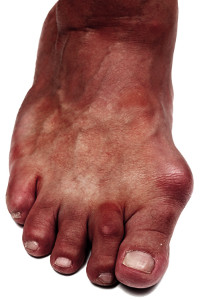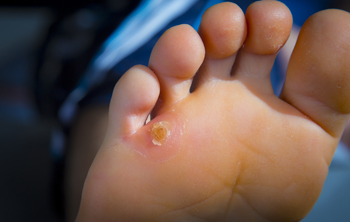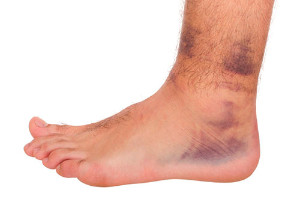 The medical term referred to as a bunion is considered to be a deformity of the big toe. The noticeable symptom is a bony protrusion on the side of the toe, and this typically occurs when the toe points inward. It may produce pain and discomfort as time progresses, in addition to a possible bump forming on the inside of the foot. Patients who are afflicted with bunions may find difficulty in wearing shoes, and may have to select larger shoes that can accommodate this condition. There are reasons why bunions may develop, including genetics which can affect the structure of the foot, and wearing shoes that fit incorrectly or are tight. Some of these types of shoes may include high heels which may not provide adequate room for the toes to move freely. Additionally, enduring an injury may be the cause for a bunion to form. If you notice a bunion beginning to form, it is advised to seek the counsel of a podiatrist who can properly treat this condition.
The medical term referred to as a bunion is considered to be a deformity of the big toe. The noticeable symptom is a bony protrusion on the side of the toe, and this typically occurs when the toe points inward. It may produce pain and discomfort as time progresses, in addition to a possible bump forming on the inside of the foot. Patients who are afflicted with bunions may find difficulty in wearing shoes, and may have to select larger shoes that can accommodate this condition. There are reasons why bunions may develop, including genetics which can affect the structure of the foot, and wearing shoes that fit incorrectly or are tight. Some of these types of shoes may include high heels which may not provide adequate room for the toes to move freely. Additionally, enduring an injury may be the cause for a bunion to form. If you notice a bunion beginning to form, it is advised to seek the counsel of a podiatrist who can properly treat this condition.
If you are suffering from bunions, contact Dr. Tina Oliver of Astro Foot Care, PA. Our doctor can provide the care you need to keep you pain-free and on your feet.
What Is a Bunion?
A bunion is formed of swollen tissue or an enlargement of boney growth, usually located at the base joint of the toe that connects to the foot. The swelling occurs due to the bones in the big toe shifting inward, which impacts the other toes of the foot. This causes the area around the base of the big toe to become inflamed and painful.
Why Do Bunions Form?
Genetics – Susceptibility to bunions are often hereditary
Stress on the feet – Poorly fitted and uncomfortable footwear that places stress on feet, such as heels, can worsen existing bunions
How Are Bunions Diagnosed?
Doctors often perform two tests – blood tests and x-rays – when trying to diagnose bunions, especially in the early stages of development. Blood tests help determine if the foot pain is being caused by something else, such as arthritis, while x-rays provide a clear picture of your bone structure to your doctor.
How Are Bunions Treated?
If you have any questions, please feel free to contact our office located in Houston, TX. We offer the newest diagnostic and treatment technologies for all your foot care needs.
Read more about Bunions Plantar warts are small growths that mainly appear at the bottom of your foot and are a common viral skin infection. Unfortunately, they spread easily and being cautious in certain public spaces is key to protecting your feet. One public space to be especially vigilant in is the gym. It is important to always wear shoes at the gym, specifically near pools, in locker rooms and showers. Simply keeping a pair of shower shoes or flip flops in your gym bag helps to keep your feet safe from the multitude of bacteria that they would otherwise be exposed to. Additionally, any cuts or small wounds should always be covered. If you have a cut, it is also a good idea to stay away from saunas and hot tubs until it is healed. Covering your feet in order to prevent contact with an infected area is the best way to avoid these uncomfortable warts. If you think you may have contracted plantar warts, it is recommended that you speak to a podiatrist to receive proper treatment.
Plantar warts are small growths that mainly appear at the bottom of your foot and are a common viral skin infection. Unfortunately, they spread easily and being cautious in certain public spaces is key to protecting your feet. One public space to be especially vigilant in is the gym. It is important to always wear shoes at the gym, specifically near pools, in locker rooms and showers. Simply keeping a pair of shower shoes or flip flops in your gym bag helps to keep your feet safe from the multitude of bacteria that they would otherwise be exposed to. Additionally, any cuts or small wounds should always be covered. If you have a cut, it is also a good idea to stay away from saunas and hot tubs until it is healed. Covering your feet in order to prevent contact with an infected area is the best way to avoid these uncomfortable warts. If you think you may have contracted plantar warts, it is recommended that you speak to a podiatrist to receive proper treatment.
Plantar warts can be very uncomfortable. If you need your feet checked, contact Dr. Tina Oliver from Astro Foot Care, PA. Our doctor will assist you with all of your foot and ankle needs.
About Plantar Warts
Plantar warts are the result of HPV, or human papillomavirus, getting into open wounds on the feet. They are mostly found on the heels or balls of the feet.
While plantar warts are generally harmless, those experiencing excessive pain or those suffering from diabetes or a compromised immune system require immediate medical care. Plantar warts are easily diagnosed, usually through scraping off a bit of rough skin or by getting a biopsy.
Symptoms
Treatment
To help prevent developing plantar warts, avoid walking barefoot over abrasive surfaces that can cause cuts or wounds for HPV to get into. Avoiding direct contact with other warts, as well as not picking or rubbing existing warts, can help prevent the further spread of plantar warts. However, if you think you have developed plantar warts, speak to your podiatrist. He or she can diagnose the warts on your feet and recommend the appropriate treatment options.
If you have any questions please feel free to contact our office located in Houston, TX. We offer the newest diagnostic and treatment technologies for all your foot and ankle needs.
Read more about Plantar Warts If your child complains of an irritation on the side of her big toe, they may have what is known as an ingrown toenail. The typical reasons why this condition may occur can be from wearing shoes that do not fit correctly and provide inadequate room for the toes to move freely in, and toenails that are trimmed improperly. Additionally, some children may pick at their toenails, and this type of action may lead to developing ingrown toenails. Some of the uncomfortable symptoms that are associated with this condition may be tenderness around the edge of the toenail, swelling and redness. If this ailment is not treated promptly, a painful infection may occur when bacteria enters the body through small cuts in the skin. It’s important to obtain a prompt and proper diagnosis, and this can be accomplished by consulting a podiatrist who can also assist in beginning correct treatment.
If your child complains of an irritation on the side of her big toe, they may have what is known as an ingrown toenail. The typical reasons why this condition may occur can be from wearing shoes that do not fit correctly and provide inadequate room for the toes to move freely in, and toenails that are trimmed improperly. Additionally, some children may pick at their toenails, and this type of action may lead to developing ingrown toenails. Some of the uncomfortable symptoms that are associated with this condition may be tenderness around the edge of the toenail, swelling and redness. If this ailment is not treated promptly, a painful infection may occur when bacteria enters the body through small cuts in the skin. It’s important to obtain a prompt and proper diagnosis, and this can be accomplished by consulting a podiatrist who can also assist in beginning correct treatment.
Ingrown toenails may initially present themselves as a minor discomfort, but they may progress into an infection in the skin without proper treatment. For more information about ingrown toenails, contact Dr. Tina Oliver of Astro Foot Care, PA. Our doctor can provide the care you need to keep you pain-free and on your feet.
Ingrown Toenails
Ingrown toenails are caused when the corner or side of a toenail grows into the soft flesh surrounding it. They often result in redness, swelling, pain, and in some cases, infection. This condition typically affects the big toe and may recur if it is not treated properly.
Causes
You are more likely to develop an ingrown toenail if you are obese, have diabetes, arthritis, or have any fungal infection in your nails. Additionally, people who have foot or toe deformities are at a higher risk of developing an ingrown toenail.
Symptoms
Some symptoms of ingrown toenails are redness, swelling, and pain. In rare cases, there may be a yellowish drainage coming from the nail.
Treatment
Ignoring an ingrown toenail can have serious complications. Infections of the nail border can progress to a deeper soft-tissue infection, which can then turn into a bone infection. You should always speak with your podiatrist if you suspect you have an ingrown toenail, especially if you have diabetes or poor circulation.
If you have any questions, please feel free to contact our office located in Houston, TX. We offer the newest diagnostic and treatment technologies for all your foot care needs.
Read more about Ingrown Toenails The act of falling is unnatural and has the potential to cause many types of serious injuries. Falling may be a result of tripping hazards, which may be prevented, including wet floors, or frayed carpets. Additionally, taking certain medications may cause mild confusion, and specific medical conditions may play a significant role, which may increase the chances of falling. These may include heart disease, thyroid dysfunction, or changes in blood pressure, which may affect balance. Research has shown there are several ways to protect yourself against the dangers of falling, including engaging in a daily exercise program, that may aid in keeping the muscles strong, in addition to having your eyesight and hearing routinely checked. Many people find it helpful to use canes or walkers while performing daily activities and find it advantageous to wear shoes that fully support their feet. If you would like additional information regarding ways to prevent falling, please consult with a podiatrist for proper guidance.
The act of falling is unnatural and has the potential to cause many types of serious injuries. Falling may be a result of tripping hazards, which may be prevented, including wet floors, or frayed carpets. Additionally, taking certain medications may cause mild confusion, and specific medical conditions may play a significant role, which may increase the chances of falling. These may include heart disease, thyroid dysfunction, or changes in blood pressure, which may affect balance. Research has shown there are several ways to protect yourself against the dangers of falling, including engaging in a daily exercise program, that may aid in keeping the muscles strong, in addition to having your eyesight and hearing routinely checked. Many people find it helpful to use canes or walkers while performing daily activities and find it advantageous to wear shoes that fully support their feet. If you would like additional information regarding ways to prevent falling, please consult with a podiatrist for proper guidance.
Preventing falls among the elderly is very important. If you are older and have fallen or fear that you are prone to falling, consult with Dr. Tina Oliver from Astro Foot Care, PA. Our doctor will assess your condition and provide you with quality advice and care.
Every 11 seconds, an elderly American is being treated in an emergency room for a fall related injury. Falls are the leading cause of head and hip injuries for those 65 and older. Due to decreases in strength, balance, senses, and lack of awareness, elderly persons are very susceptible to falling. Thankfully, there are a number of things older persons can do to prevent falls.
How to Prevent Falls
Some effective methods that older persons can do to prevent falls include:
Falling can be a traumatic and embarrassing experience for elderly persons; this can make them less willing to leave the house, and less willing to talk to someone about their fears of falling. Doing such things, however, will increase the likelihood of tripping or losing one’s balance. Knowing the causes of falling and how to prevent them is the best way to mitigate the risk of serious injury.
If you have any questions, please feel free to contact our office located in Houston, TX. We offer the newest diagnostic and treatment technologies for all your foot care needs.
Read more about Falls Prevention Many people will experience some type of ankle pain at some point in their lives. If you have fallen and have injured the ligaments, you may have what is referred to as an ankle sprain. These ligaments aid in connecting the leg bones to the foot and may often become injured as a result of a fall that has occurred. There may be noticeable symptoms appearing, which may include bruising, the inability to walk on the ankle, pain and discomfort, or swelling. To determine if the ankle is sprained or broken, a proper diagnosis is performed, which will typically include having an X-ray taken. If the injury appears to be severe, an MRI may be taken, which may be helpful in observing detailed images of the ankle. There are several ways to treat an ankle sprain, and it is suggested to speak with a podiatrist who can properly guide you toward choosing the correct treatment option.
Many people will experience some type of ankle pain at some point in their lives. If you have fallen and have injured the ligaments, you may have what is referred to as an ankle sprain. These ligaments aid in connecting the leg bones to the foot and may often become injured as a result of a fall that has occurred. There may be noticeable symptoms appearing, which may include bruising, the inability to walk on the ankle, pain and discomfort, or swelling. To determine if the ankle is sprained or broken, a proper diagnosis is performed, which will typically include having an X-ray taken. If the injury appears to be severe, an MRI may be taken, which may be helpful in observing detailed images of the ankle. There are several ways to treat an ankle sprain, and it is suggested to speak with a podiatrist who can properly guide you toward choosing the correct treatment option.
Ankle pain can have many different causes and the pain may potentially be serious. If you have ankle pain, consult with Dr. Tina Oliver from Astro Foot Care, PA. Our doctor will assess your condition and provide you with quality foot and ankle treatment.
Ankle pain is any condition that causes pain in the ankle. Due to the fact that the ankle consists of tendons, muscles, bones, and ligaments, ankle pain can come from a number of different conditions.
Causes
The most common causes of ankle pain include:
Symptoms
Symptoms of ankle injury vary based upon the condition. Pain may include general pain and discomfort, swelling, aching, redness, bruising, burning or stabbing sensations, and/or loss of sensation.
Diagnosis
Due to the wide variety of potential causes of ankle pain, podiatrists will utilize a number of different methods to properly diagnose ankle pain. This can include asking for personal and family medical histories and of any recent injuries. Further diagnosis may include sensation tests, a physical examination, and potentially x-rays or other imaging tests.
Treatment
Just as the range of causes varies widely, so do treatments. Some more common treatments are rest, ice packs, keeping pressure off the foot, orthotics and braces, medication for inflammation and pain, and surgery.
If you have any questions, please feel free to contact our office located in Houston, TX. We offer the newest diagnostic and treatment technologies for all your foot care needs.
Read more about Ankle Pain